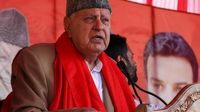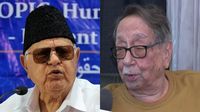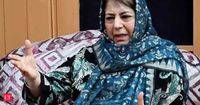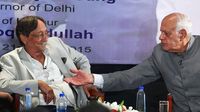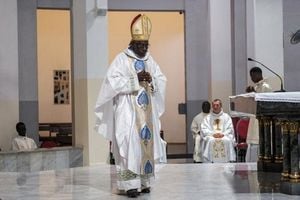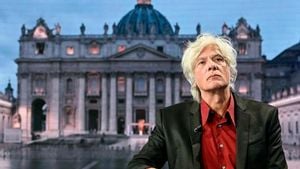In a political storm brewing in Jammu and Kashmir, former Research and Analysis Wing (RAW) chief A.S. Dulat's latest book, The Chief Minister and the Spy, has ignited controversy over its claims regarding former Jammu and Kashmir Chief Minister Farooq Abdullah's stance on the abrogation of Article 370. The book, set to be released on April 18, 2025, alleges that Abdullah, who publicly condemned the 2019 revocation of Kashmir's special status as a "betrayal," privately suggested that the National Conference could have helped pass the proposal in the legislative assembly if consulted.
Dulat, who served as the head of the RAW and was a key backroom negotiator during Atal Bihari Vajpayee's administration, claims that Abdullah expressed a willingness to support the move had he been taken into confidence. According to Dulat, Abdullah told him, "We would have helped. Why were we not taken into confidence?" This assertion has sparked outrage among Abdullah and his supporters, who vehemently deny any such backing.
Farooq Abdullah, responding to Dulat's claims, expressed his disappointment, stating, "It is unfortunate that he calls me a friend; a friend can't write like this... He has written such things which are not true." The former Chief Minister emphasized that the National Conference had consistently opposed the abrogation of Article 370 and accused Dulat of fabricating statements for sensationalism. He argued, "If we had to betray Article 370, why would I pass a resolution on autonomy with a two-thirds majority in the Assembly?"
The political implications of Dulat's book are significant, particularly given the backdrop of Abdullah's formation of the People's Alliance for Gupkar Declaration (PAGD) after his release from detention in early 2020. This coalition united various political rivals in demanding the restoration of Jammu and Kashmir's autonomy and statehood. Abdullah's critics, including the People's Democratic Party (PDP) and Sajad Lone's party, have seized upon Dulat's revelations to accuse him of betraying the interests of the people of Kashmir.
In his book, Dulat portrays Abdullah as "the most misunderstood Kashmiri politician," highlighting three major betrayals he faced from New Delhi: the dismissal of his government by Indira Gandhi in 1984, the attempt by Atal Bihari Vajpayee to replace him with his son Omar in 2002, and his arrest following the abrogation of Article 370 in 2019, which Dulat calls "the greatest tragedy of Kashmir." Dulat asserts that Abdullah is "the tallest leader in the country," surpassing even Prime Minister Narendra Modi and Home Minister Amit Shah in political stature.
Despite the backlash, Dulat has attempted to clarify his position, stating, "Whatever is being said about Farooq Abdullah is not true. People should read the whole book; someone has taken a snippet and blown it out of proportion. All this is rubbish." He maintains that the book is an appreciation of Abdullah rather than a critique, emphasizing that he never stated that Abdullah supported the abrogation of Article 370.
In a recent interview, Dulat reiterated that Farooq Abdullah had expressed deep disappointment over the manner in which the abrogation was conducted. He recalled Abdullah's words, "If the government wanted to do this, they should've taken us into confidence. But instead, we were put under house arrest." This sentiment underscores the complex relationship between Abdullah and the Indian government, as well as the broader tensions surrounding Kashmir's political landscape.
Meanwhile, opposition parties have capitalized on the controversy, accusing Abdullah of compromising on Kashmir's interests. PDP leader Mehbooba Mufti has claimed that Omar Abdullah met Amit Shah in 2014 and advised against forming a government with the PDP, suggesting a willingness to collaborate with the BJP. This narrative has fueled further speculation about the National Conference's political alignments.
As the release date of Dulat's book approaches, the political ramifications are becoming increasingly pronounced. Abdullah's rejection of Dulat's claims highlights the ongoing struggle for narrative control in Kashmir, where historical grievances and contemporary political dynamics intersect. The former Chief Minister's assertion that Dulat's portrayal is a "figment of imagination" raises questions about the motivations behind the book's publication and the potential impact on Kashmir's political future.
In a broader context, the controversy surrounding The Chief Minister and the Spy reflects the complexities of Kashmir's political environment, where personal relationships and historical legacies intertwine with contemporary issues of governance and autonomy. As both Dulat and Abdullah navigate this heated discourse, the stakes remain high for the people of Jammu and Kashmir, who continue to grapple with the implications of political decisions made in New Delhi.
Ultimately, the unfolding drama surrounding this book serves as a reminder of the intricate and often contentious nature of politics in Kashmir, where every revelation can spark a firestorm of debate and dissent.

